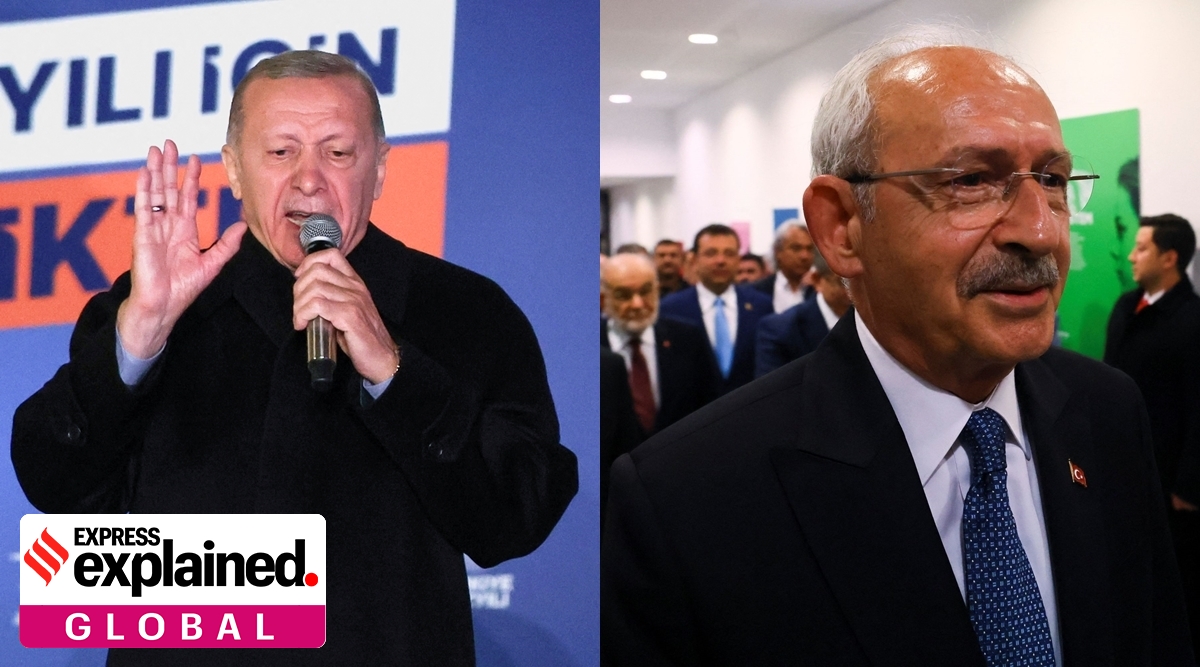Why is Turkey likely to hold a second election on May 28 to elect its President?
Neither President Recep Tayyip Erdogan nor his main challenger Kemal Kilicdaroglu appear to have won the required 50% of the vote in the May 14 first round. Erdogan is said to have an edge in the second round that is scheduled for May 28.
 Turkish President Tayyip Erdogan (L) and his main challenger, Kemal Kilicdaroglu. A May 28 runoff election will decide who is president. (Photos: Umit Bektas and Yves Herman/ Reuters)
Turkish President Tayyip Erdogan (L) and his main challenger, Kemal Kilicdaroglu. A May 28 runoff election will decide who is president. (Photos: Umit Bektas and Yves Herman/ Reuters) The name of Turkey’s new President will likely not be revealed for another two weeks. Incumbent Recep Tayyip Erdogan and his challenger Kemal Kilicdaroglu, candidate of a six-party opposition alliance, appear set to contest a runoff election on May 28.
So what happened in Sunday’s (May 14) election?
Almost all of the vote has been counted, and neither President Erdogan nor Kilicdaroglu has won more than 50 per cent of the vote. A Reuters report published mid-morning India time on May 15 quoted the state-owned news agency Anadolu as saying almost 97% of ballot boxes had been counted, and Erdogan was leading with 49.39% of votes and Kilicdaroglu had 44.92%. The same report said Turkey’s High Election Board had given Erdogan 49.49% with 91.93% of ballot boxes counted, describing what appeared to be an earlier situation.
Sunday night’s polling closed at 5 pm local time, which is 7.30 pm in India. The first results started to be reported around midnight India time, and came in through the night.
But if Erdogan has got more votes than his challenger, why hasn’t he won already?
That’s because Turkey does not have a system like India, where the candidate with the most votes is declared elected, irrespective of what percentage of the total vote she gets. A presidential candidate in Turkey must win at least 50% of the votes cast to be declared elected — and neither Erdogan nor Kilicdaroglu appear to have achieved that magic percentage.
According to Turkish election law, in a situation where no candidate gets 50% of the vote, the top two candidates will face each other in a direct contest in a runoff election that will be held on the Sunday after the one following the election. Erdogan and Kilicdaroglu will, therefore, face off again on May 28.
In 2018, the last time the presidential election was held, there had been no need for a runoff as Erdogan, with 53% of the vote, had won outright against three other candidates in the first round. The next candidate had won 31% of the vote.
And what will happen in the runoff election?
Both Erdogan and Kilicdaroglu have expressed confidence that they will win. Opinion polls before Sunday’s election had been giving Kilicdaroglu almost 50%, so the President has performed better than expected. On Sunday night, he sounded confident and combative while addressing supporters, Reuters reported.
The report quoted Hakan Akbas, managing director of the consultancy Strategic Advisory Services, as saying Erdogan will likely have an edge going into the runoff.
“The next two weeks will probably be the longest two weeks in Turkey’s history and a lot will happen. I would expect a significant crash in the Istanbul stock exchange and lots of fluctuations in the currency. Erdogan will have an advantage in a second vote after his alliance did far better than the opposition’s alliance,” he said.
Analysts noted that the May 14 vote was set to give Erdogan’s ruling alliance a majority in the Turkish Parliament, which could potentially help him heading into the runoff. Besides the president, Turkish voters also voted for 600 members of Parliament on Sunday.
The analysts also said the actions of the third candidate for president, Sinan Ogan, could be crucial going into the runoff. Ogan got 5.3% of the vote in the first round, and he could be a “kingmaker” in the runoff depending on which candidate he endorses, another Reuters report said, quoting analysts.
Ogan, an academic with Azerbaijani Turkish roots, is a candidate of the rightwing Ancestral Alliance (ATA) who belonged to the far right Nationalist Movement Party (MHP), but walked out after MHP leader Devlet Bahceli started backing Erdogan in 2015.
- 01
- 02
- 03
- 04
- 05






































